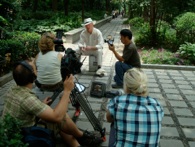
Keeping China Green: A TV Series Exploring the Principles of Sustainable Development
China is quickly becoming a dominant economic force worldwide in the 21st century. Rapid industrialization and social change have raised the standard of living for millions of its people, mainly in the East and Southeastern coastal provinces, who can now afford to buy washing machines, televisions, and, increasingly, cars.
But this success comes at great environmental cost. China has followed a pattern similar to many other countries of both the developed and developing world. The process of industrialization is often linked to deteriorating environmental quality and rarely turned around until a country has increased its standard of living.
Environmental degradation is the downside of China’s tremendous economic progress. Fifty percent of the world’s construction is expected to take place in China in the next 15 years. How can China fuel its booming economy while reducing its ecological footprint?
With its Government’s concern and intention to pursue ìscientific developmentî which can be defined as sustainable development with specific efforts at environmental protection, China represents a real opportunity to leap frog the profligate waste, inefficiency and environmental decay of the many industrialized nations.
It can learn a lot from the West, mostly from its mistakes and unsustainable development practices – like dependence on external oil and the companies that deliver it.
China is making large-scale infrastructure investments for the first time. Working from primarily a blank slate, it can create green communities from the ground up, using state-of-the–art green technologies, avoiding many of the problems of other industrial countries.
Keeping China Green by employing proven sustainable development practices is what this TV series is about. The series will explore China’s efforts at sustainable development from its extensive plans for eco-cities, green buildings and clean energy development to individual conservation efforts.
Some Anticipated Topics include:
The Inconvenient Truth(s) – What are the essential unavoidable truths that must be dealt with if sustainable development is to occur.
Principles of Sustainable Development – What does it mean to be “sustainable” “Hard” vs. “Soft” approaches to meeting resource needs.
Greenwash Is Not Enough – Just calling something “green” does not make it so. The danger of hype and boosterism and the need to separate it from real environmental action.
Negawatts – “The cheapest kilowatt is the saved kilowatt.” Exploring efforts at increasing efficiency, both at production and end-use.
Environmental Regulation – Using economic incentives and other measures to control environmental impact. China is an ideal candidate for the growing funds paying for carbon emissions reductions and emission reduction credits as well as other environmental protections.
At this moral moment, China can take the lead by setting the standards for a new century and providing a role model for other developing (as well as developed) nations. Our program hopes to support its efforts for Keeping China Green.
David Sutton is a human ecologist and an international consultant specializing in, ecological conservation, sustainable development, integral health and creative communications. With over thirty years experience teaching at the University level, working with major Fortune 100 Companies, International Research Institutes, Publishers, Governmental and Non-Governmental Organizations, he is engaged throughout the world for his creativity, problem-solving and writing skills.
Dr. Sutton began a long active environmental career in 1970 with the First Earth Day for which he was one of the original University organizers. He was then at the University of California helping start the new environmental studies program there. In 1973, he wrote the first University textbook on “ecological systems” for the nation’s many developing environmental studies programs. Throughout a twenty-five year University teaching career, he specialized in teaching international development and sustainable tourism was involved in many environmental research and education projects. While at Stanford University, he created the Antaeus Center for Sustainable Tourism working with many providing planning, design and training help to developing world-wide tourism destinations. They worked in East Africa, Mexico, Central America, particularly Costa Rica, as well as Peru and India. He was even part of the initial “opening up” in china in 1984. He was a founding member of the International Ecotourism Society and is a Fellow of the Royal Geographic Society.
His program development and management experience includes serving as Director of Program Development for the John Muir Institute for Environmental Studies, where he developed federally funded (HEW/OE) environmental education curriculum materials. He has consulted on large research projects for the US Dept. of Education, US Dept. of Energy (DOE), US Agency for International Development, ARCO, and Charles F. Kettering Foundation, Carnegie Foundation, Far West Laboratory for Educational Research and Development, American Institutes for Research in the Behavioral Sciences, Stanford Research Institute, Jet Propulsion Laboratory, and others. As Director of Public Information and Education for DOE’s Western Regional Solar Energy Center (WesternSUN), where he supervised a staff of 14 and managed over a million dollars of federal funds, he was responsible for public information, educational, and publishing programs for the thirteen western states. He is was a principal instructor in the training of trainers for Sweden’s, The Natural Step in the USA. In the summer of 2008 he assisted the Communications Unit at the United Nations Office of Project Services (UNOPS) in Copenhagen